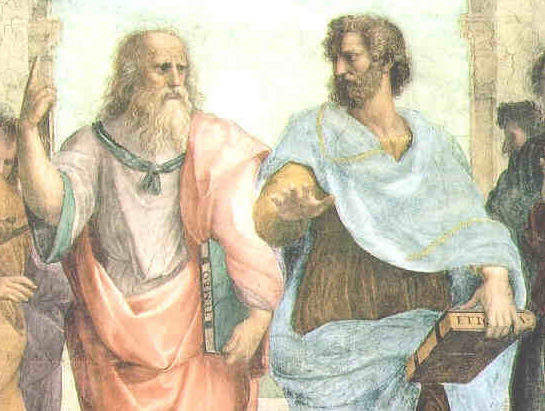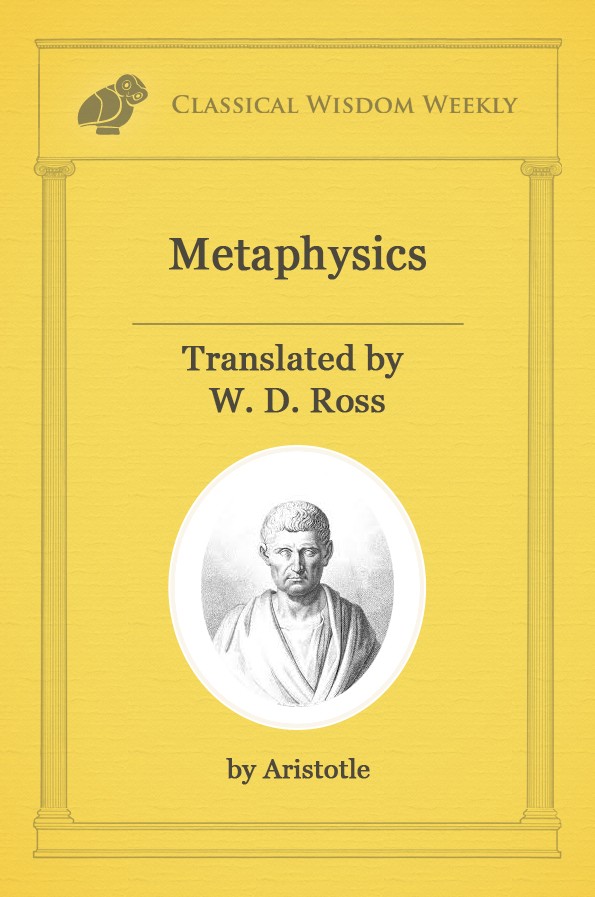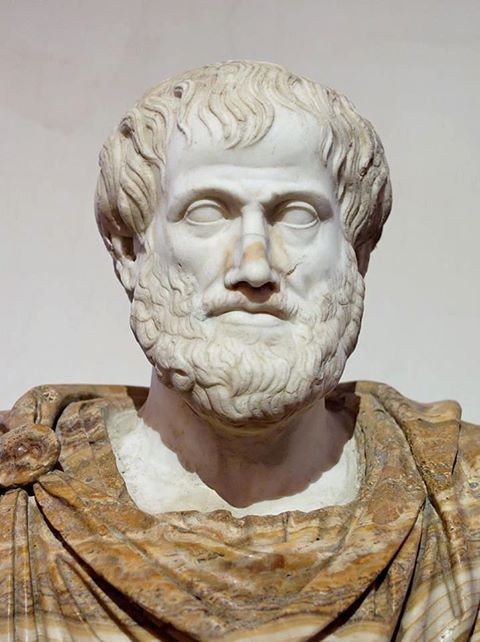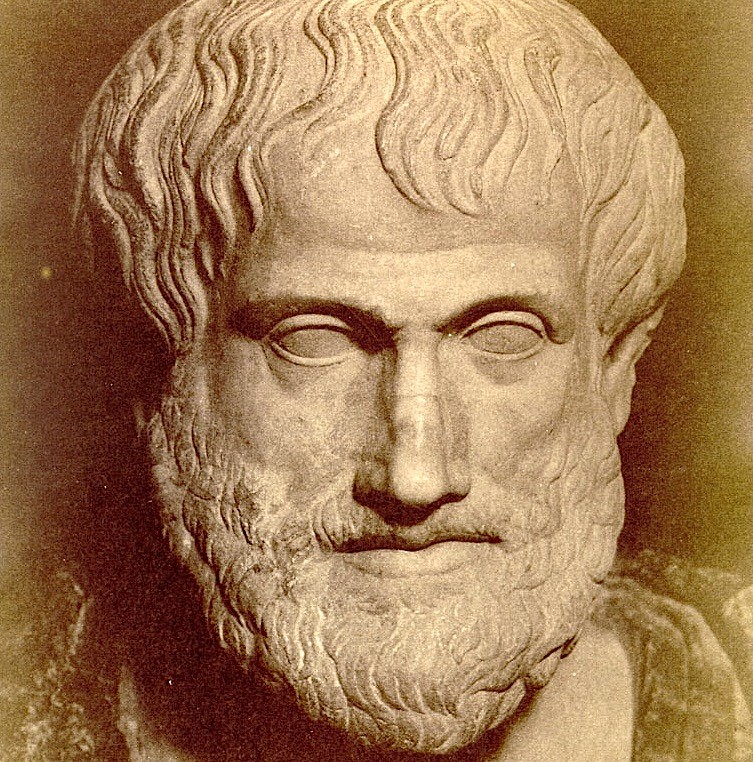Before you get too excited, or perhaps frightened, rest assured that we will not be going in to too much depth regarding Aristotle and his rather detailed explanation of motion. I have mentioned before that tackling too much Aristotle at once can lead to spontaneous bouts of insanity. I spent many restless nights as an undergrad tossing and turning, trying to make sense of sentences like…
“In any case, the actuality of what is potentially F, whenever, being in actuality, it is active-not insofar as it is itself, but insofar as it is moveable- is motion.” –Aristotle (Physics)
Try to explain that to yourself without having nightmares…
And so to avoid unnecessary confusion, we will let Aristotle’s formalized logic take a back seat on this particular road trip. While we could spend our time exhaustively examining the logical arguments that Aristotle lays out for the definition of motion, the types of motion, and the actuality and potentiality for motion within all things, we will settle for an abridged version instead. I simply do not have the time, patience, or caffeine required to discuss the entirety of Aristotle’s Physics in the span of this article.
What will be of principle interest to us is Aristotle’s assertion that for every motion, there is a mover. Sometimes this mover is rather obvious, such as a man who throws a rock. And sometimes this mover is not so obvious, such as the mover that initially started the orbiting of the planets.
Not one to shy away from big questions, Aristotle arrives at conclusions for the motions of the universe through a rather simple and eloquent series of arguments. That does not, however, mean that his conclusions are without severe implications.
But before we get to all that, let’s first take a brief look at Aristotle’s consideration of motion. Aristotle argues that time is a type of motion. When we consider something in terms of “before” and “after” we recognize change, change implies motion. And so we begin to think of time as a type of motion; or if you prefer, time is a series of motions.
We need not dive too deeply into these waters, but we must recognize that time and motion is intimately connected, perhaps even synonymous. Keep this in mind as you begin to read the next paragraph.
Aristotle considers the supposition that there existed a time before the actualization of motion. But as we have seen, motion is connected to time. A time before motion would imply a time before time; this proposition seems impossible.
Time has always existed. By extension of this, motion has always existed. We must conclude that time and motion did not come to be, but that they have both always existed.
Having nightmares yet?
Aristotle continues by saying that all things have a potentiality for motion. The actuality of this potentiality is motion. We will use this as a definition of sorts.

Other things undergo motion by force or by means that are contrary to its nature. A cat may undergo motion by its own agency when it struts around your living room. However, you could also initiate motion by putting the cat in a catapult.
Get it? catapult?
The first example is what Aristotle called “natural motion.” The second example is a type of motion that exists as a possibility even if it is contrary to the cat’s nature. We call this “forced motion.”
A certain puzzle arises when we apply the ideas of natural and forced motion when considering particular elements like fire, air, and earth. We cannot say that fire or air move upwards by their own agency, that is to say that fire and air did not decide to travel upwards the way a cat decided to strut about your house.
If for arguments sake we said that fire or air did move upwards on their own volition, then they would also be responsible for their cessation of movement. Our decision to walk is complimented by our capability to stop walking. However, a fire will always move upward. An air bubble caught underwater will always travel to the surface.

To employ just a bit of formalized logic, we could say that B initiates motion in A. That is not because of B itself, but because C initiated motion in B.
Aristotle uses the example of a stone that is moved by the agency of the stick. The stick is moved by the agency of the hand. The hand is moved by the agency of the man. It goes on and on.
Now we are getting to the good stuff
We can see that there appears to be an endless regress. A is moved by B. B is moved by C. C is moved by D – so on and so on. The question is, how far back does it go?
To answer this, Aristotle proposes what is known as the “unmoved mover.” This entity would be the end of the line, so to speak. The unmoved mover would have initiated movement within the universe. More importantly, the unmoved mover would not have been set in motion by another thing.
Aristotle does not view this as a leap of faith, but rather as a logical consistency. All things are moved by something. At the same time, it is impossible to have an infinite regress when considering the motion of finite things. The logical conclusion is that there must have been something to start the ball rolling.
“Since motion must be everlasting and must never fail, there must be some everlasting first mover, one or more than one.” -Aristotle’s Physics
Remember how we concluded that motion is eternal earlier on? If we stick with that line of thinking, then we must conclude that the unmoved mover is also eternal, existing for all of time.
Aristotle takes all this one more step. Motion is the actuality of a potentiality. Even infinite motion is motion of a sort, which means that it possesses a potentiality for motion. The unmoved mover is eternal and so is perpetually actualizing the potentiality of motion.
This is important when we consider that Aristotle believed an entity to be most fulfilled and loved when it is actualizing its potential. This would seem to imply that the unmoved mover is constituted by eternal love, wisdom and fulfillment.

Is this starting to sound familiar? It indeed begins to sound like an explanation for the existence of a God. And sure enough, Aristotle does make reference to a God as the unmoved mover within Metaphysics.
It is often difficult to reconcile the seemingly contradictory ideas that motion has existed forever and that motion was also started by the unmoved mover, God. If something has always existed, how could it have started to begin with?
If this is an idea of concern, Aristotle does not appear to be very worried about it. If there is any philosopher who does give us a satisfactory answer, or at least one that isn’t down right absurd, it’s Thomas Aquinas.
Thomas Aquinas, the rock star of a theologian that he is, claimed that observers often confuse two different points. The first is that God, or the unmoved mover, created the universe. The second is that the universe had a beginning. Aquinas believed that God created the universe. But he could have just as easily created an eternal one. A universe created by God, owes its existence to God, but that does not necessarily mean that the universe had to have a beginning.

Aquinas gives the example of a footprint that has existed eternally in the sand. Even though we recognize that the footprint has existed for eternity, there is no denying that a foot is chiefly responsible for its existence.
While Aristotle’s argument seems compelling, there are certain suppositions that may appear unsubstantiated. Aristotle claims that the unmoved mover is eternally actualizing the potentiality for motion. This is important because we have previously stated that motion is eternal. Aristotle claimed that the unmoved mover must be composed of love and wisdom because the actualization of a potentiality is the source of joy, love, and wisdom. By this way of thinking, the unmoved mover is eternally loving and wise. We start to see where the existence of God becomes unavoidable.
However, we need not accept this. It may seem implausible to say that the actualization of a potentiality is the root of virtues like love and wisdom. Perhaps these are human creations, subjective ideas with no metaphysical basis.
If we were to think this way, then we might conclude that Aristotle’s unmoved mover is not necessarily an entity. It could just as well have been some initial force that created the motion within the universe. And here we arrive at something reminiscent of the theory of the Big Bang.
Aristotle’s Physics is a rather extraordinary philosophical text, if for no other reason than it arrives at a conclusion through reason alone that is strikingly similar to our modern understanding of the origins of the universe.
That will conclude our examination of Aristotle for today. I hope that your mind is appropriately expanded, and that you will not have too many nightmares.











8 comments
Outstanding article with one exception, it ends promoting big bang dogma… In terms of our lack of understanding regarding dark energy and dark matter (just to name a few), mentioning the big bang while excluding them is like talking about a bumper as if it represented an entire automobile. Moreover, not taking anything away from the giants of old, an unmoved mover has always reeked of anthropic bias (thanks Bostrom). Rendering a universe for a sapient observer is the work of a programmer or collection of them… Whether there is an unprogrammed programmer or not, now that is a better question indeed.
Nice… I appreciate the perspective!
But the musings of old philosophy do not seem so difficult to envisage to my mind. The esoteric nature of reality is far more mysterious than our simple minds care to comprehend.
Always we try to imagine things in boxes and always when the line is drawn the thing lies both in and outside the box… Like time; we like that box. Time only exists as our subjective frame of reference; and it, like reality itself both does and does not exist. Just as the photon exists in transit as both particle and wave.
All things are and are not. Likewise, god both is and is not and we shall never know which one it is but we can in the mean time still learn an awful lot about what god is’nt. Maybe in time we shall come to learn a little of the nature of what god may be but I’m damn sure all these religions are making a tremendous effort to obscure these truths from themselves.
I think; therefore I am…. and am not… time will soon see to that one eh :)
Aristotle claimed that the unmoved mover must be composed of love and wisdom because the actualization of a potentiality is the source of joy, love, and wisdom. By this way of thinking, the unmoved mover is eternally loving and wise. We start to see where the existence of God becomes unavoidable. —————- If there is no love, joy, wisdom. I have zero interest in pursuing something. Why would I waste my time pursuing a female to create a relationship and eventually a family if their is no love, joy, wisdom coming from it, or actually come from it’s existence in the future?
I appriciate this work! now I understand, thanks!
Fascinating, thank you for sharing your understanding (definately no mean feat to have achieved!)…is it crazy to think of the laws of thermodynamics (conversion of energy, entropy and absolute 0) in the context of this? And perpetual motion ( or it’s impossibility) ? I am also in general amazed by the understanding of the World in and through Greek mythology (and its semantics, words and definitions of abstract concepts and ideas) which are just different ways of explaining our existence in a random and ever transitioning ‘motion’ through space and time. It seems we all have the potential or instinct (?) to understand it (through the experience of life) expressing, visualising and communicating this to others is however another ‘matter’, and I admire all those writers, philosophers, scientists, mathematicians, musicians, artists, etc…who were and are able to do so.
Understanding the concepts of wisdom by so many in the past says little for our present men of thought..The alternatives to God are limited but nonetheless they do exist..Sufferings..Evil to no end…Wars..WHY ? whom or what created God ?..I as one try to comprehend the big picture but my mind nor any mind will ever comprehend where this all originated…Too big….
@Rob, not sure if you will read this, but you asked ‘why’. The answer is: out of love. God created all this out of love for himself. He is all that is and all that is not, at the same time. God just ‘is’. It is the ultimate consciousness, the only one that has ever been, that is and always will be.
Imagine yourself sitting in a room, only darkness around you. You see nothing, but you ‘know’ that you are. You exist, but you don’t know who you are, what you are or what you are not. There is nothing to look at yourself from to see who you are. Therefore, God devided in this and that to have a point of reference outside himself. That’s what we call the big bang. In that way it is possible for him to be able to look at himself and to experience what he is and what he is not. In that moment, polarity was created as well as relativity. A thing could be here first and then there. Polarity is the greatest gift God ever gave to himself.
We say that wars are bad because there is the opposite: peace. You know what is evil because there are good things. Polarity means there is always the opposite of a concept. Hell – dark, hot – cold, good – evil, love – fear. One term would not exist without the other.
To recognize ourselves, we always look at others first. Who they are, what they own, what they say, what they do. We recognize who we are and that we either act the same way or differently. As an example, when seeing a ladder we always look upwards first to realize we’re standing down. We always look at others first. That’s what God is still doing. He experiences himself through us. We are his points of reference from which he can look at himself. He recognizes through us what he is and what he is not. Everything happens for God to experience himself. And we are God in the focus of Rob, Bahia, Putin, your boss, your mum, Angela Merkel, the bus driver, the cashier in the supermarket and so on.
If it is allowed to mention, the book series ‘Conversations with God’ by Neale Donald Walsch gives a good understanding of who God is, who we are and why the world is the way it is.
Edit: ‘light’ – dark. Forget to translate into English
Trackbacks
Our apologies, you must be logged in to post a comment.